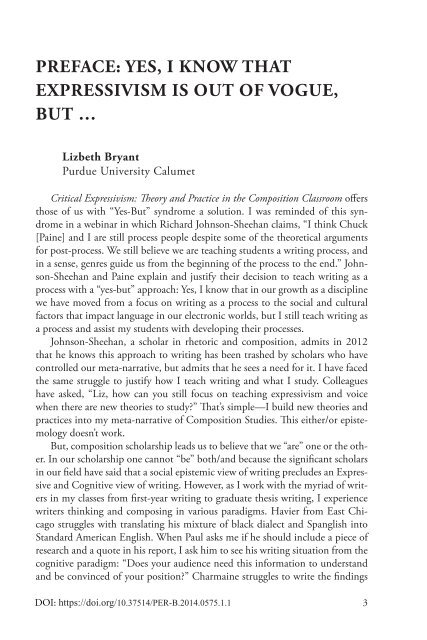Critical Expressivism- Theory and Practice in the Composition Classroom, 2014a
Critical Expressivism- Theory and Practice in the Composition Classroom, 2014a
Critical Expressivism- Theory and Practice in the Composition Classroom, 2014a
You also want an ePaper? Increase the reach of your titles
YUMPU automatically turns print PDFs into web optimized ePapers that Google loves.
PREFACE: YES, I KNOW THAT<br />
EXPRESSIVISM IS OUT OF VOGUE,<br />
BUT …<br />
Lizbeth Bryant<br />
Purdue University Calumet<br />
<strong>Critical</strong> <strong>Expressivism</strong>: <strong>Theory</strong> <strong>and</strong> <strong>Practice</strong> <strong>in</strong> <strong>the</strong> <strong>Composition</strong> <strong>Classroom</strong> offers<br />
those of us with “Yes-But” syndrome a solution. I was rem<strong>in</strong>ded of this syndrome<br />
<strong>in</strong> a web<strong>in</strong>ar <strong>in</strong> which Richard Johnson-Sheehan claims, “I th<strong>in</strong>k Chuck<br />
[Pa<strong>in</strong>e] <strong>and</strong> I are still process people despite some of <strong>the</strong> <strong>the</strong>oretical arguments<br />
for post-process. We still believe we are teach<strong>in</strong>g students a writ<strong>in</strong>g process, <strong>and</strong><br />
<strong>in</strong> a sense, genres guide us from <strong>the</strong> beg<strong>in</strong>n<strong>in</strong>g of <strong>the</strong> process to <strong>the</strong> end.” Johnson-Sheehan<br />
<strong>and</strong> Pa<strong>in</strong>e expla<strong>in</strong> <strong>and</strong> justify <strong>the</strong>ir decision to teach writ<strong>in</strong>g as a<br />
process with a “yes-but” approach: Yes, I know that <strong>in</strong> our growth as a discipl<strong>in</strong>e<br />
we have moved from a focus on writ<strong>in</strong>g as a process to <strong>the</strong> social <strong>and</strong> cultural<br />
factors that impact language <strong>in</strong> our electronic worlds, but I still teach writ<strong>in</strong>g as<br />
a process <strong>and</strong> assist my students with develop<strong>in</strong>g <strong>the</strong>ir processes.<br />
Johnson-Sheehan, a scholar <strong>in</strong> rhetoric <strong>and</strong> composition, admits <strong>in</strong> 2012<br />
that he knows this approach to writ<strong>in</strong>g has been trashed by scholars who have<br />
controlled our meta-narrative, but admits that he sees a need for it. I have faced<br />
<strong>the</strong> same struggle to justify how I teach writ<strong>in</strong>g <strong>and</strong> what I study. Colleagues<br />
have asked, “Liz, how can you still focus on teach<strong>in</strong>g expressivism <strong>and</strong> voice<br />
when <strong>the</strong>re are new <strong>the</strong>ories to study?” That’s simple—I build new <strong>the</strong>ories <strong>and</strong><br />
practices <strong>in</strong>to my meta-narrative of <strong>Composition</strong> Studies. This ei<strong>the</strong>r/or epistemology<br />
doesn’t work.<br />
But, composition scholarship leads us to believe that we “are” one or <strong>the</strong> o<strong>the</strong>r.<br />
In our scholarship one cannot “be” both/<strong>and</strong> because <strong>the</strong> significant scholars<br />
<strong>in</strong> our field have said that a social epistemic view of writ<strong>in</strong>g precludes an Expressive<br />
<strong>and</strong> Cognitive view of writ<strong>in</strong>g. However, as I work with <strong>the</strong> myriad of writers<br />
<strong>in</strong> my classes from first-year writ<strong>in</strong>g to graduate <strong>the</strong>sis writ<strong>in</strong>g, I experience<br />
writers th<strong>in</strong>k<strong>in</strong>g <strong>and</strong> compos<strong>in</strong>g <strong>in</strong> various paradigms. Havier from East Chicago<br />
struggles with translat<strong>in</strong>g his mixture of black dialect <strong>and</strong> Spanglish <strong>in</strong>to<br />
St<strong>and</strong>ard American English. When Paul asks me if he should <strong>in</strong>clude a piece of<br />
research <strong>and</strong> a quote <strong>in</strong> his report, I ask him to see his writ<strong>in</strong>g situation from <strong>the</strong><br />
cognitive paradigm: “Does your audience need this <strong>in</strong>formation to underst<strong>and</strong><br />
<strong>and</strong> be conv<strong>in</strong>ced of your position?” Charma<strong>in</strong>e struggles to write <strong>the</strong> f<strong>in</strong>d<strong>in</strong>gs<br />
DOI: https://doi.org/10.37514/PER-B.2014.0575.1.1<br />
3


















